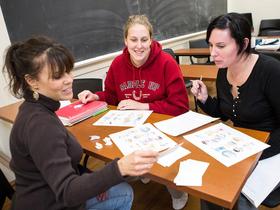Community colleges have traditionally been focused on getting in, getting an associate degree in two years or less, and getting into the workforce as quickly as possible. Those who wanted to continue their education had to take on the headache of transferring all of their community college credits to a four-year institution. Today, a number of community colleges are offering bachelor's degrees to student who complete associate degrees and want to take their training and education to the next level - without leaving campus.
What's Different about Community College Bachelor's Degrees?
While many students are clamoring for a spot in a four-year community college program that costs much less than a similar degree from a nearby university, community colleges are stressing the point that they are not trying to be just like the four-year postsecondary institutions. First, most community colleges offering bachelor's degrees are doing so as an extension of their own associate degree programs. Students earn the associate degree first to become eligible to apply for the bachelor's program.
These bachelor's degrees will also differ from traditional university offerings because they will be limited to degree programs that can take students directly into the workforce. In keeping with the long-standing tradition of community colleges to raise up a new generation of work-ready adults, these programs are designed specifically with a profession in mind. Instead of offering liberal arts programs in political science or English, these bachelor's degrees will be in specific fields like



























